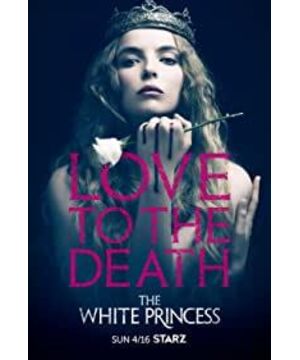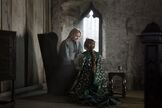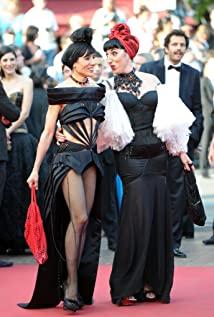The last episode was a mess. Under the eye of the Duchess of Burgundy and the Scottish army, Lizzy decided to kill her brother and the Earl of Warwick to save her son and husband. , but in the last ten minutes Lizzy suddenly reversed, and then the actor ended the performance like this. In the previous scene, Lizzy also condemned the Queen Mother Red for killing the prince in the tower and couldn't face God, bringing a curse to the little prince, and then she changed her face in a second to kill her loved ones, and let the curse fall on her head. It may be dramatic, but it's too rushed. Maybe it's because the drama can't show so many inner activities. The reason why the author Philippa Gregory handles this is inseparable from his firm feminist position in writing. Gregory's series of works highlight the image of women, discover women hidden behind men in history, and depict strong rather than brave " big women", but the possible weaknesses of such writing make history a completely female-dominated narrative. In "The White Queen" it's not a weakness, it strikes the right balance, but in "The White Princess" (at least on TV) it's a weakness where Henry VII was nothing but a mother and wife, and faced with The fear of cowardice was unbelievable as Prince Richard, Henry VII was weakened into a puppet who was still at the mercy of others, especially in the last episode Lizzy put the crown on Henry VII on one knee and made him go to court, ordering him Saluting like the Queen Mother is too typical. Because of the feminist writing position, Gregory made Elizabeth, who was in a dilemma between her younger brother and her husband, who should have no choice but to accept her fate (no matter what fate), was forced to write it as Wu Zetian who was assertive. Richard was overwhelmed by the shock of the brithright on the throne, felt that he was a fake king, and was afraid of the curse of the White Queen, and then Elizabeth killed her brother and cousin so ruthlessly to settle everything. Philippa Gregory's emphasis on women's subjectivity, and the over-attachment to the image of women's strength and fortitude, makes this story unreasonable. If Tudor and the Queen Mother took the initiative to kill Richard, the relationship between husband and wife would break down, and Elizabeth was forced to choose between her brother and her husband and children. After the curse fell on Prince Arthur, he died in tears under multiple blows (in history, Elizabeth died in tears) 37 years old, his eldest son Arthur died in 1502, she died in 1503). Such a tragic and helpless fate seems to be more reasonable than a quick knife with an iron fist and a hard heart. Of course, reading the book may have a different experience. If there are more psychological descriptions in the original book, the official ending may be more acceptable. In addition, some people object to the curse plot. I have to wash the ground for the author. This is a reasonable setting. This is related to the slander and family legend of the mother and daughter of the White Queen in history. See my other comment for details.The witchcraft and Melusine of the White Queen and Mother and Daughter were originally my favorites, but the last episode was a complete mess. If I don't watch the last episode, I can give it five stars, but I can barely give it three stars. Because I like this IP and eliminate the recency effect, I will give it four stars. . .
View more about The White Princess reviews











